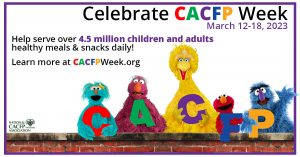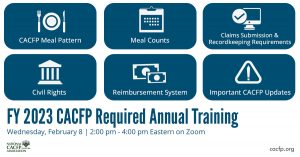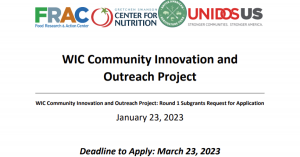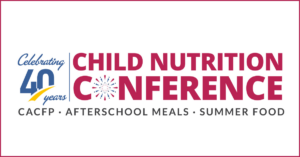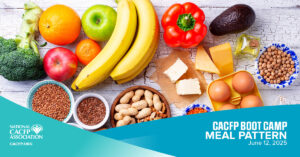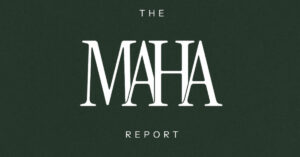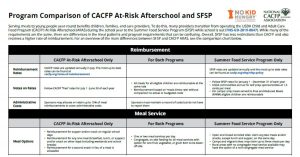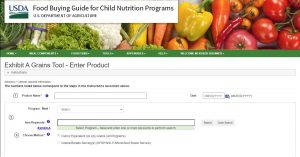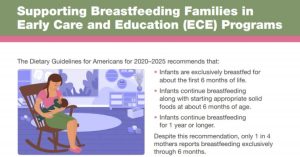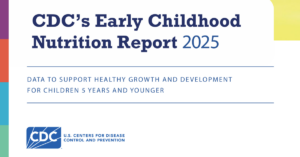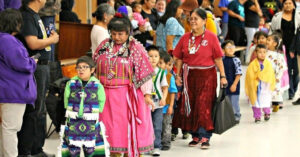In December 2022, the Indiana University CACFP Project Team released a report describing the child nutrition and care provision experiences among early care and education (ECE) stakeholders, sponsors, and center directors during the COVID-19 pandemic. The study was conducted in four states and a variety of ECE stakeholders participated. The study identifies six common experiences among ECE stakeholders during the COVID-19 pandemic.
Read MoreNational CACFP Week is March 12-18,2023. What can you do to celebrate?
Read MoreThe CACFP plays a vital role in nutrition equity for children and adults in centers and day care homes by providing access to healthful meals. Sponsors and providers are critical for the continued success of this program. The required annual training in the Child and Adult Care Food Program (CACFP) is a critical component in…
Read MoreIn December 2022, the Indiana University CACFP Project Team released a report describing the facilitators and barriers to CACFP participation by family child care homes (FCCHs). The report concludes with suggestions for potential strategies to promote participation in the CACFP by FCCHs. The study was conducted in two states, Arizona and New York, that have varying levels of CACFP participation. The study outlines the facilitators and barriers to FCCHs’ enrollment in CACFP and recommends a few strategies to increase participation.
Read MoreApply for WIC outreach funding! Sponsoring organizations are well placed to do great WIC outreach, as they have large networks of providers with whom they can disseminate WIC information. Providers will then have the information they need to share with the families they serve who may be eligible to participate in WIC.
Read MoreWe’ve covered home-frozen foods, now how about home-canned foods? Are they #CACFPCreditable?
Read MoreThe National CACFP Association (NCA) proudly announces the 2026 National Child Nutrition Conference (NCNC26), celebrating 40 years of advancing nutrition in child and adult care settings across the country.
Read MoreThe National CACFP Association (NCA) is reaffirming its commitment to continuing education by offering a variety of virtual training opportunities that support child nutrition professionals at every stage of their careers.
Read MoreServing reimbursable meals begins with a solid understanding of the CACFP meal pattern. Learn more with our Meal Pattern Boot Camp!
Read MoreGet a rundown on all things happening in May at NCA. Annual Training is happening this month. Don’t miss out!
Read MoreWe’re bringing you workshops on nutrition, program administration, operations, financial and nonprofit management, and more.
Read MoreUSDA has the authority to waive statutory or regulatory program requirements for Child Nutrition Programs. State Agencies can submit a 12(l) waiver application to USDA in order to allow for flexibilities, including off-site monitoring, in their state. In Fiscal Year 2025, at least nine States have applied and been approved for an off-site monitoring waiver.
Read MoreNorth Carolina Governor’s Task Force on Child Care and Early Education analyze child care budgets to evaluate how to improve pay for early childhood educators.
Read MoreThe White House released the President’s Budget for Fiscal Year 2026, which includes cuts to discretionary spending for Child Nutrition Programs (CNPs). While the budget maintains full funding for Child Nutrition Programs, like the CACFP and SFSP, the cuts to discretionary spending include the Patrick Leahy Farm to School Grant and the Institute for Child Nutrition (ICN), a National Ally of NCA.
Read MoreThe CACFP has many benefits – it supports child care providers and ensures that children and adults in care receive nutritious meals. The CACFP is also critical in supporting working families and supporting the development of young children into successful adults.
Read MoreThe USDA released a memorandum stating that they support and encourage states and school districts to experiment with meals to provide interesting, healthy, and diverse meals.
Read MoreOn May 22, 2025, the White House published the Make Our Children Healthy Again Assessment which provides an overview of the current state of child health in the United States. The Assessment was created in response to an executive order that established the President’s Make America Healthy Again Commission. The Assessment will be used to create a Make Our Children Healthy Again Strategy which is required to be published by August of this year.
Read MoreThe Child and Adult Care Food Program has new creditable foods listed on the USDA Food Buying Guide! If you are new to the FBG, this interactive tool allows for easy display, search, and navigation of food yield information. In addition, users can compare yield information, create a favorite foods list, and access tools, such as the Recipe Analysis Workbook (RAW) and the Product Formulation Statement Workbook.
Read MoreThe Child and Adult Care Food Program community asked for more Spanish resources to be available on the National CACFP Sponsors Association website and we heard you! Available now in Spanish are more resources to help sponsors and providers with meal pattern requirements, best practices, and so much more!
Read MoreServing meals to young people year-round benefits children, families, and care providers. To do this, many providers transition from operating the USDA Child and Adult Care Food Program (CACFP) At-Risk Afterschool (ARAS) during the school year to the Summer Food Service Program (SFSP) while school is out. For an overview of the main differences between SFSP and CACFP ARAS, see the comparison chart below.
Read MoreNCA understands that the end of flexibilities will cause challenges for many CACFP sponsors and providers and we commend your continued commitment to providing nutritious meals and snacks to the children or adults in your care. In preparation for the end of the additional reimbursement, we have collected the following resources to help you successfully provide meals even if your available budget decreases.
Read MoreCDC created three new fact sheets for Early Care and Education (ECE) providers about Early Child Nutrition and Feeding. The fact sheets offer tips and best practices for supporting breastfeeding families, information about safe storage and handling of breastmilk, and strategies for introducing solid foods.
Read MoreIf a grain product list enriched grains as the first ingredient, is the product creditable in the CACFP?
Read MoreCan a mixed age group of 1- and 2-year-olds all be served unflavored 1% milk in the CACFP?
Read MoreAre vegetable spirals creditable in the CACFP?
Read MoreCan a provider serve yogurt that they have frozen?
Read MoreCan a pureed vegetable that is mixed into a dish credit towards the meal pattern?
Read MoreAre dehydrated vegetables creditable in the CACFP?
Read MoreThe Child and Adult Care Food Program has new creditable foods listed on the USDA Food Buying Guide! If you are new to the FBG, this interactive tool allows for easy display, search, and navigation of food yield information. In addition, users can compare yield information, create a favorite foods list, and access tools, such as the Recipe Analysis Workbook (RAW) and the Product Formulation Statement Workbook.
Read MoreThe Child and Adult Care Food Program community asked for more Spanish resources to be available on the National CACFP Sponsors Association website and we heard you! Available now in Spanish are more resources to help sponsors and providers with meal pattern requirements, best practices, and so much more!
Read MoreServing meals to young people year-round benefits children, families, and care providers. To do this, many providers transition from operating the USDA Child and Adult Care Food Program (CACFP) At-Risk Afterschool (ARAS) during the school year to the Summer Food Service Program (SFSP) while school is out. For an overview of the main differences between SFSP and CACFP ARAS, see the comparison chart below.
Read MoreNCA understands that the end of flexibilities will cause challenges for many CACFP sponsors and providers and we commend your continued commitment to providing nutritious meals and snacks to the children or adults in your care. In preparation for the end of the additional reimbursement, we have collected the following resources to help you successfully provide meals even if your available budget decreases.
Read MoreCDC created three new fact sheets for Early Care and Education (ECE) providers about Early Child Nutrition and Feeding. The fact sheets offer tips and best practices for supporting breastfeeding families, information about safe storage and handling of breastmilk, and strategies for introducing solid foods.
Read MoreA recent study by our partners at Child Care Aware® of America reveals that parents across the nation are struggling to find affordable, high-quality child care. The survey shows that parents are piecing together multiple care arrangements and facing challenges balancing work and caregiving.
Read MoreThe CDC’s 2025 Early Childhood Nutrition Report gives us a big-picture look at how young children in the U.S. are eating and growing. It focuses on kids from birth to age 5 and shares important facts about breastfeeding, starting solid foods, eating healthy and how states support good nutrition.
Read MoreThe “Characteristics of Emergency Shelters Participating in the CACFP” study by USDA seeks to better understand the characteristics of CACFP emergency shelters, who they serve, how CACFP fits into their operations, and their challenges with CACFP. The study was conducted in 2023 and collected data from 242 emergency shelters that participate in CACFP in Fiscal Year 2023.
Read MoreA survey was administered in the spring of 2023 of licensed California family child care homes (FCCH) to assess the perceived impacts of the increased reimbursement during the Covid-19 pandemic on CACFP participation and anticipated challenges with reinstated tiered rates.
Read MoreThe USDA recently released a study on the “Characteristics of Adult Day Care Centers that Participate in the USDA’s Child and Adult Care Food Program” which seeks to better understand key characteristics of adult day care centers participating in CACFP.
Read MoreUSDA released a survey report focused on SFSP and SSO sponsors who operated the non-congregate meal service option in qualifying rural areas in summer 2023.
Read More

